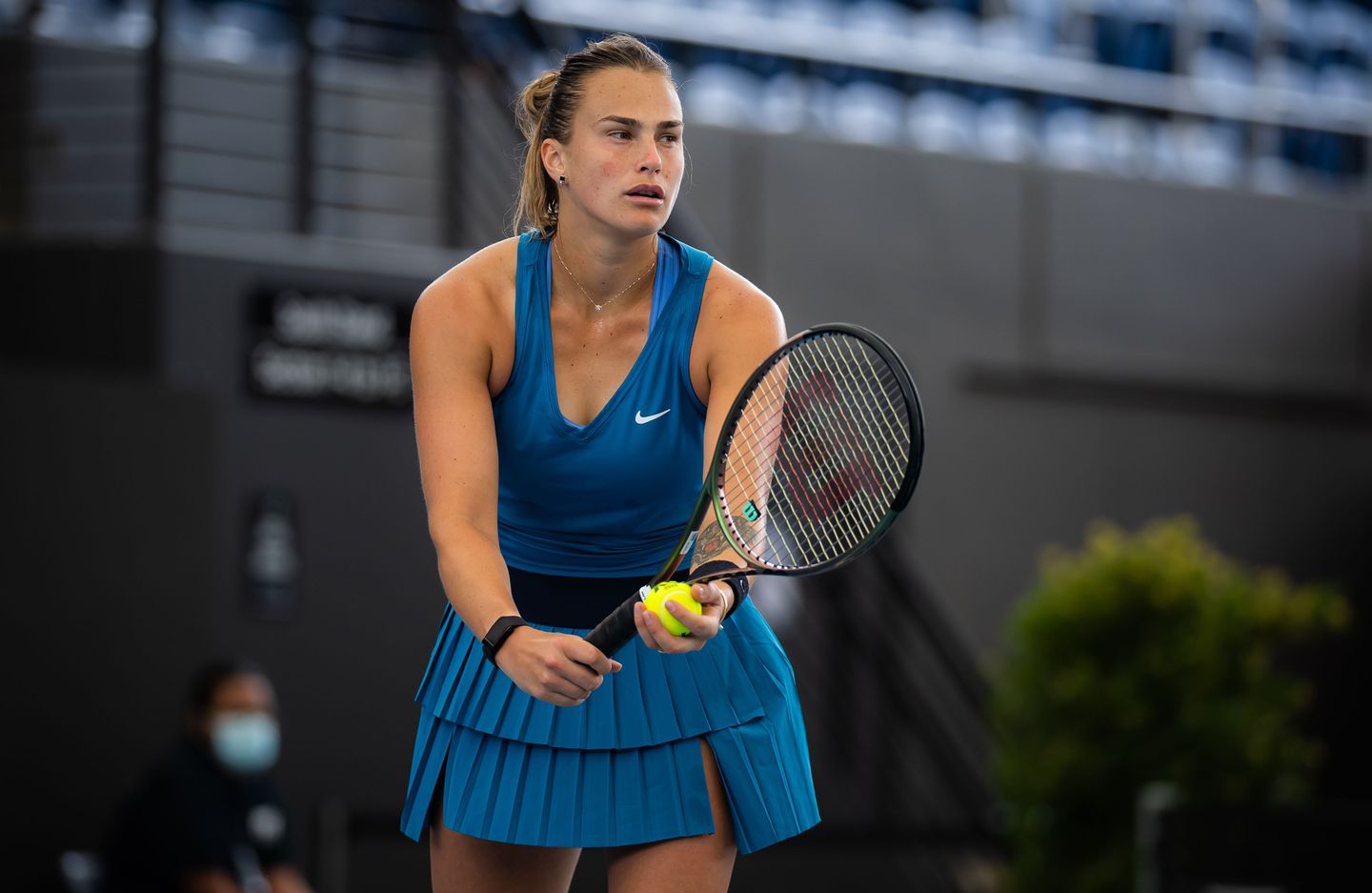Aryna Sabalenka understands that in moments of crisis, she can sometimes be her own worst enemy.
“I would say that all that matches which I lost, I think it’s just all about me,” she said in Adelaide before the 2022 season began. “I mean, I make winner or I make unforced errors. I just have to focus on myself, try to make less unforced errors than winners.
“That’s it.”
In the in-or-out, black-and-white world of professional tennis, that is it. If only the rest of us – navigating our relationships, finances and professions – had that kind of all-or-nothing clarity to contemplate as we stride through life.
It’s important to remember that Sabalenka is still only 23 years old; in fact, she’s the second-youngest player ranked among the WTA’s Top 10. Her sheer athleticism – even among peers, she’s gifted with uncommon speed, vision and hand-eye-coordination – has led to enormous expectations for several years now.
In 2021, Sabalenka began to approach those impossibly high standards imposed by some of the people who follow this great game. After never advancing past the fourth round in 14 previous majors, the Belarusian cracked the code wide open, reaching the semifinals of the year’s last two majors. She finished the year at No.2, behind Ashleigh Barty. That doesn’t leave a lot of room for improvement.
Recently, 18-time Grand Slam champion Martina Navratilova broke down the games of the WTA’s top players. After urging Sabalenka to come to net more often and develop a more consistent volley that will finish points, Navratilova added this:
“Most of all, control the temper better. You cannot let your head get in the way.”
Sabalenka will be the first to tell you that her sometimes volatile emotional state sometimes dictates whether those crucial points end with winners or unforced errors.
Her 2022 season did not begin well. She dropped her first two matches, at separate events in Adelaide, hitting a total of 39 double faults. Several times, she hit underarm serves in a three-set loss to Rebecca Peterson. At one point, chair umpire Julie Kjendlie asked her if she was OK.
“This is my technical problem,” a distraught Sabalenka said. “I cannot serve better.”
In her media day press conference ahead of the Adelaide International, Sabalenka broke down the pattern that cost her a handful of meaningful 2021 matches.
“Usually I win the first set and then I can start missing a lot, trying to overhit the ball, like make more winners,” Sabalenka said. “Then I start losing in the third set. When the opponent get this feeling that they can do it, it’s tough.
“I just have to don’t try to overhit the ball and just be there from the beginning ‘til the end. Don’t give these big opportunities for the people.”
And that is her major homework assignment for 2022.
Let’s look at those two semifinal losses, which played out in remarkably similar fashion.
At Wimbledon, Sabalenka had already weathered two three-set matches, finishing with wins against wildcard Katie Boulter in the second round and Elena Rybakina in the fourth. A decisive straight-sets win over Ons Jabeur vaulted her into a career-first semifinal opposite Karolina Pliskova, whom she had beaten in their two previous matches – in three sets, saving match points three years earlier in Cincinnati.
Serving fabulously, Sabalenka won the first set 7-5. And then she started pressing. Pliskova broke her at love in the fifth game and, serving well herself, collected the second set 6-4. In the first game of the third set, a smoking return on break point by Pliskova created a lead she would not relinquish. On the only break point she faced, on set point in the first, Pliskova gifted Sabalenka with a double fault.
The key? “To be patient,” Pliskova said, “which is tough, especially for me. But, yeah, worked out in the end.”
It was the first time in a decade that the loser of the opening set won a women's singles semifinal at Wimbledon.
A few weeks later, after a decisive straight-sets victory over French Open champion Barbora Krejcikova, Sabalenka found herself in the US Open semifinals, facing teenager Leylah Fernandez, who had already taken out Naomi Osaka, Angelique Kerber and Elina Svitolina.
Again, Sabalenka came out quickly, winning the first three games. Serving at 4-2, though, she double-faulted on the game’s third break point. There was another critical double fault in the tiebreaker, which went to Fernandez. The second set went to Sabalenka, who seemed to have a huge edge in experience, playing in her second straight major semifinal.
But serving at 4-5 in the third, two more double faults helped Fernandez escape with the victory. In a match of narrow margins where Fernandez won two more points than Sabalenka, eight double faults and 52 unforced errors were the difference.
“She started incredibly well in the beginning,” Fernandez said afterward, “but I’m just glad I was able to stay patient, fight for every point.”
Patience, there’s that word again. If Sabalenka can acquire just a little bit more going forward, she’ll give herself the chance to take the next step.
What would make 2022 better than 2021?
“If I win a Grand Slam, I think,” she said. “I think those two matches, which I lost in the semifinals, was that little step to make this dream true. I mean, I was really nervous in that matches. I think right now I kind of understand that I can do it.
“OK, semifinal, I don’t have to overthink or over-rush, panic. Right now I think I’ll not be nervous on the semifinal again in the Grand Slam. Doesn’t matter on what’s going on around you, you just have to focus on your game. No matter what, you can do it.”

